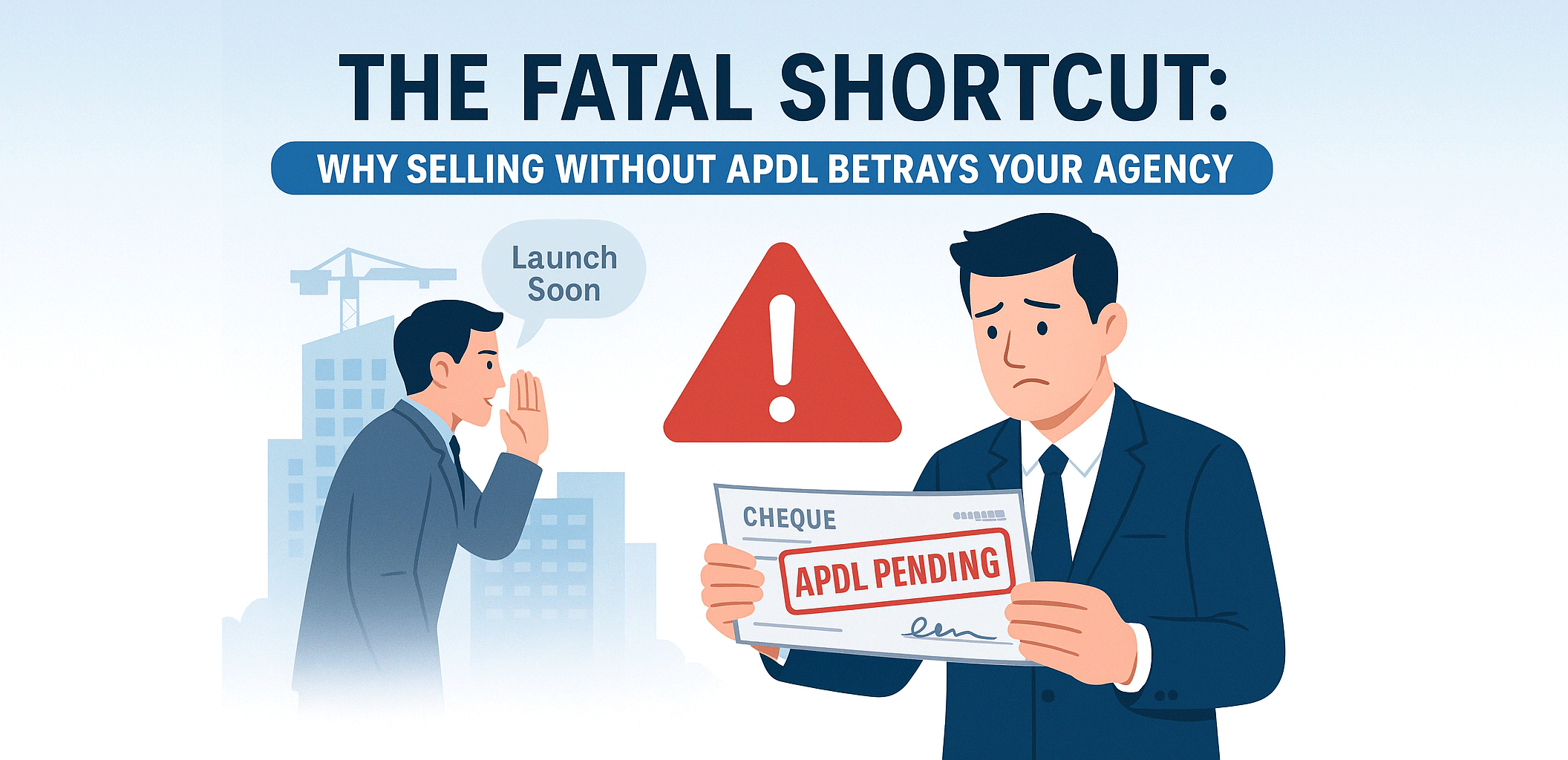The Fatal Shortcut: Why Selling Without APDL Betrays Your Agency

It’s the classic developer hustle: great location, attractive price, and a "pre-launch briefing" request. Then comes the trap: "We're still waiting for the APDL, but let's start collecting interest now to ride the momentum."
To the agency, it sounds like an early-bird opportunity. To the law, it’s a compliance landmine.
Marketing, selling, or taking deposits without a valid Advertising Permit and Developer’s Licence (APDL) isn’t just risky—it’s unlawful, financially unrecoverable, and a direct threat to your agency’s license and brand integrity.
Let’s dismantle the illusion and explain why this shortcut inevitably backfires.
1. The Burden Shift: The Developer’s Risk Becomes Yours
The developer's goal is simple: secure a database of buyers and sales momentum before their APDL is approved. They cannot legally advertise or sell until then.
So, they pass the burden—and the entire legal risk—to you.
Your agency is asked to:
- Run vague ads: "New Mont Kiara Condo Launch Soon!"
- Use code names to evade compliance.
- Take "earnest deposits" or "reservation fees" parked outside of official channels.
This looks like smart marketing, but it's a compliance setup. You are the one visible in the market. When the regulator or buyer starts asking questions, you, the agent, are the visible legal target.
2. The Legal Wall: No APDL = No Advertising, No Booking
Under Malaysian housing development laws (the HDA), the prohibition is absolute. No APDL means no advertisement, no booking, and no deposit.
If the project stalls, or legal issues arise, who faces the heat?
- You advertised misleadingly.
- You collected the money (even if parked under a lawyer).
- You made the representation to the buyer.
- You are the face the buyer remembers, and your license is the one at risk.
The "Holding Cheque" Myth Is a Cosmetic Loophole
Some developers and lawyers peddle the myth of "holding an open-dated cheque" or parking the deposit under a lawyer's account to circumvent the law. This is not a legal shield. The substance of the transaction is what matters. If the buyer believes they have reserved a unit and you have accepted a monetary instrument, the spirit of the law has been breached.
3. The One-Year Nightmare: Trust Capital Exhausted
The greatest danger isn't the penalty; it's the loss of buyer confidence. The classic scenario:
- Your team sells the hype for months.
- The APDL is chronically delayed (sometimes for over a year).
- Buyers grow frustrated, suspecting a scam.
The result is catastrophic: Your agency gets blamed, your marketing spend is lost, and the initial hype is replaced by buyer resentment. You cannot rebuild momentum when your audience feels misled, regardless of whether the APDL eventually arrives.
4. Financial Exposure: You Absorb 100% of the Loss
Let’s be brutally clear: Developers are not paying your ad spend, and they will not reimburse you for failure.
When a non-APDL pre-launch stalls or fails:
- Your agency loses the entire marketing budget.
- Your agents lose months of time, leads, and professional trust.
- Your brand absorbs the reputational damage.
The developer simply walks away to the next project or the next agency willing to gamble. They bear zero financial consequence for a compliance failure they engineered.
5. Reputational Risk: From Partner to Pariah
In a trust-driven industry, your reputation is your currency. Agents who promote grey-zone projects are quickly tagged as reckless or complicit. Buyers do not distinguish between the developer's entity and your agency's logo.
The price of one "shortcut project" can be:
- Buyer complaints to professional authorities.
- Negative market word-of-mouth that follows your agents.
- The erosion of trust within your own team.
Is a few months of "early lead time" worth a multi-year brand hit? The answer is no.
The Only Safe Play: Do Not Market the Project
You do not need to operate in the legal grey zone to achieve early traction. The only ethical and legally sound approach is to refuse any project-specific marketing until the document is in hand.
Your team must focus solely on activities that are entirely decoupled from the specific development:
- General Brand Building: Market education and content creation under your agency's name.
- Database Warming: Collection of contact details for a general interest mailing list about the developer's future opportunities, with zero mention of unit-specific details, prices, or floor plans.
Your agency must wait for the APDL. Your trust capital is far more valuable than any single project's early momentum.
Final Verdict: Selling Without APDL Is Selling Without Protection
Every shortcut looks smart until it backfires. Marketing or selling before APDL is structurally one-sided:
- The developer gains buzz.
- The buyer gains confusion.
- You gain legal liability and brand erosion.
Protect your license, your team, and your reputation. If the project isn't legally ready, you are in violation of the law. Think twice before gambling your license for someone else's win.











































































































